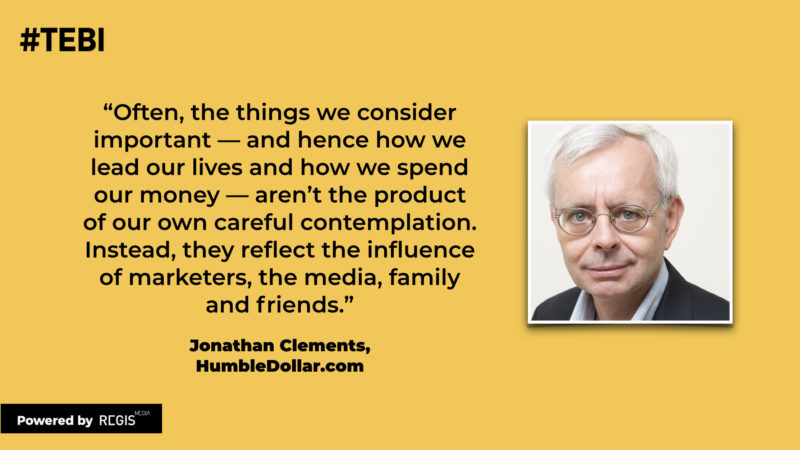
Investing is a means to an end, not an end in itself. You need to know what you’re investing for and what you want to achieve. That’s why we strongly recommend that investors have a financial plan and, preferably, work with a professional financial planner.
This is the first in a new series of occasional articles explaining how the planning process works. The article focuses on the importance of working out what we want from life and how we really want to spend our money. It’s written by Jonathan Clements, a fellow journalist and financial educator whose work I have admired for several years. We’re very privileged to have Jonathan as a contributor.
By JONATHAN CLEMENTS
How we choose to spend our time and money is a declaration of what we deem important. A modest example: We might enjoy watching a wide array of channels, including live sport and the latest movies, while caring little about the clothes we wear, and that’s reflected in our costly TV subscription and minimal spending on clothing. And there’s nothing wrong with a choice like that — if it is indeed what we want.
But is it? Often, the things we consider important — and hence how we lead our lives and how we spend our money — aren’t the product of our own careful contemplation. Instead, they reflect the influence of marketers, the media, family and friends. We aren’t pursuing the life we want, but rather the life we’ve been told we should want.
We are especially vulnerable to this when we’re younger. Here are just five of the messages we grow up hearing:
— A better life is just one exam, one college acceptance, one promotion and one pay raise away.
— If we work hard today, we’ll get our reward later — not just more money, but also time to kick back and relax.
— Possessions — especially new, expensive possessions — bring happiness.
— Money is the yardstick by which we measure success.
— It’s crass to talk about how much we earn and how much money we have.
What are the consequences of these five messages? Because we can’t talk about how much money we have — and we don’t really know how much others have — we spend money to signal our financial success to others. But, of course, the more we signal, the less money we actually have.
Meanwhile, we’re constantly striving to get ahead. That’s great if we’re engaged in work we truly enjoy. But there’s a risk we get no great pleasure from either the work or the reward, and instead find ourselves on the hedonic treadmill, pursuing goals we believe will make us happy, but ultimately leave us no more satisfied than before.
What’s the solution? Instead of buying into the messages that are foisted upon us, we need to figure it out for ourselves. This, alas, may require not just days or weeks, but decades.
Partly, it’s because experience is a great teacher, but a slow one: It often takes many years to learn what does and doesn’t make us happy. But I also believe ageing itself changes our perspective, as we come to grips with our dwindling time. That changing perspective has three key components:
1. We want to make the years ahead as memorable as possible.
After thousands of disappointing purchases, many of us see a familiar pattern: Our excitement over the new living room furniture and the latest remodelling project quickly wanes, and soon we’re hankering after something else. But our shrinking time horizon also plays a role. We don’t want to waste precious time looking after these possessions and, frankly, we have fewer years left to enjoy them. Instead, we want to make our remaining time as special as possible — and that drives us to focus less on buying possessions and more on purchasing experiences, especially experiences enjoyed with friends and family.
2. We want to devote our days to activities we’re passionate about.
Looking back, we realise all the promotions and pay raises haven’t left us permanently happier, and the spells of relaxation weren’t much of a reward. Worse still, we often spend a good portion of each workday on nonsense — nonsense wrought by others — and this rankles ever more as we grow older and time grows shorter. The fact is, we’d much rather devote our days to activities we think are important. This is what drives many folks to change careers late in life and perhaps even launch their own business. It also fuels the desire to retire, so we can call the shots on how we spend each and every day.
3. We care less about how we’re perceived — and more about our own peace of mind.
Early on, we might have wanted an endless stream of new possessions, so we could signal our success to others. But now, it seems like a tiresome waste of time and money. We’d rather the financial security of a fatter nest egg than the silly pleasure of trying to impress others.
Leading the life we want
Admittedly, it’s hard to completely abandon material wealth as a yardstick of success. But again, experience helps. We have plenty of friends who are richer but seem to trudge through life. We can recall earlier times when we had far less money but were just as happy. But mostly, we have a better sense for how much we need to lead the life we want — and we’re pretty sure a bunch more money wouldn’t make a whole lot of difference.
JONATHAN CLEMENTS is an experienced financial journalist. He spent almost 20 years on the Wall Street Journal and has written several books about investing and personal finance. He is the Founder and Editor of HumbleDollar.com and Director of Financial Education for Creative Planning in Overland Park, Kansas. You can follow him on Twitter @ClementsMoney.
This article first appeared on HumbleDollar and is republished here with Jonathan’s kind permission.








